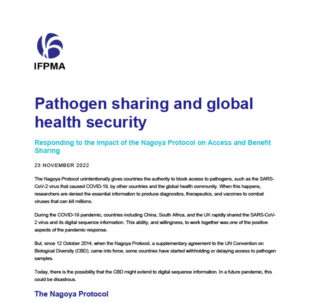Pathogen sharing and global health security

The Nagoya Protocol unintentionally gives countries the authority to block access to pathogens, such as the SARSCoV-2 virus that caused COVID-19, by other countries and the global health community.
When this happens, researchers are denied the essential information to produce diagnostics, therapeutics, and vaccines to combat viruses that can kill millions. During the COVID-19 pandemic, countries including China, South Africa, and the UK rapidly shared the SARS-CoV2 virus and its digital sequence information. This ability, and willingness, to work together was one of the positive aspects of the pandemic response.
But, since 12 October 2014, when the Nagoya Protocol, a supplementary agreement to the UN Convention on Biological Diversity (CBD), came into force, some countries have started withholding or delaying access to pathogen samples. Today, there is the possibility that the CBD might extend to digital sequence information. In a future pandemic, this could be disastrous.
Looking ahead
IFPMA’s vision IFPMA is actively representing the innovative pharmaceutical industry in policy discussions with governments and international health bodies to help ensure pathogens and their information are shared more widely and speedily. We ask Member States and relevant multilateral partners to help facilitate the fast and unencumbered sharing of pathogens and their data to help deliver on the 100-Day Mission and deliver its full benefits for the sake of global public health.


